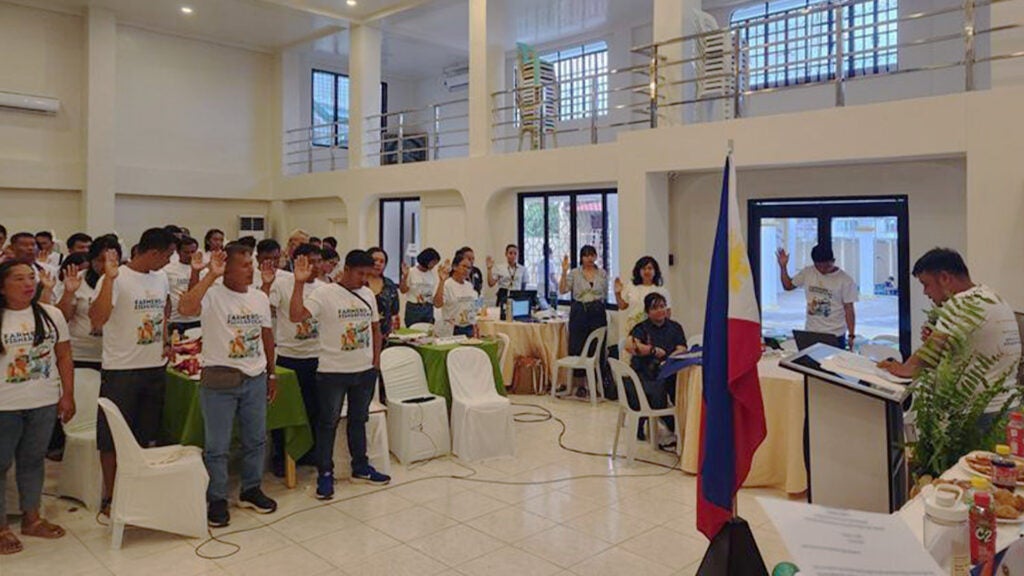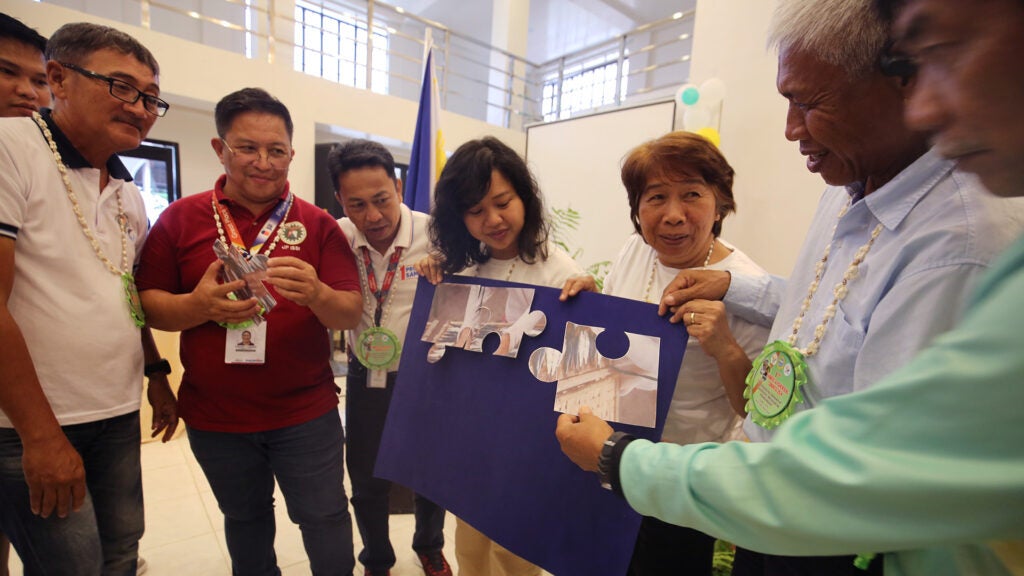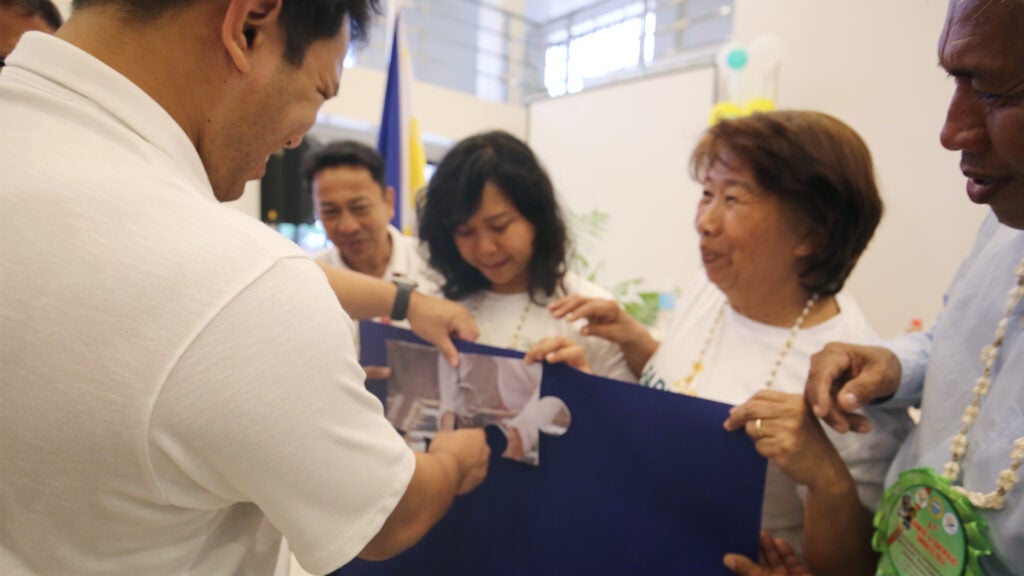Oceana launches new Food and Livelihood Campaign to reduce fish loss and boost livelihood in Daram, Samar
Press Release Date: October 2, 2024



Oceana, leading international organization dedicated to marine conservation, has launched its Food and Livelihood Campaign today in Daram, Samar. The activity coincides with the Farmers and Fisherfolk Congress, addressing critical issues in local fisheries, particularly on post-harvest processes and losses, and interventions to address poverty and fostering sustainable livelihoods for coastal communities who rely heavily on marine resources for food and livelihoods.
The municipality of Daram, in Samar has a mostly coastal population of over 40,000 and a poverty rate of over 40%, more than double the national average rate of 18%. Fishing is a primary livelihood, as Daram has the largest municipal waters in the Samar Sea.
Most households in Samar (60.5%) and Northern Samar (75.1%) experienced food insecurity during 2018, well above the national average of 54%.
Recent studies by Oceana in Samar and Northern Samar indicate that up to 40% of fish catch is lost from harvest to marketing. As the catch of fisherfolk is almost entirely used for domestic consumption, this fish loss means not just a loss of income for the fisher, but a loss of food for the community. And these communities are the same places that top the list of areas with malnutrition and high poverty incidence.
“Ang isang problema namin sa Daram ay, majority ng mga isda namin, hindi nadadala dito. Nadadala sa malapit na city. Wala kaming facilities, kulang din kami sa processing. Hirap ang ice dito – sa malayo pa namin kinukuha. Kapag may ice na, sigurado kami na iyong mga mangingisda natin, dito na rin pupunta at dadami na rin ang isda sa Daram. (One of our problems in Daram is that majority of our fish catch are not brought here. The fishers sell these in the city. We don’t have facilities and we lack processing. It’s also hard to find ice here. If ice will be available, our fishers will surely bring their catch here and we’ll more fish available in Daram.),” said Daram Mayor Philip Astorga.
Oceana said science-based and participatory Fisheries Management Areas (FMA), and the full implementation of the National Management Plan for sardines and vessel monitoring requirements for all commercial fishing vessels to address illegal commercial fishing in municipal waters support efforts to empower fisherfolk, combat poverty and ensure food security for families, all without having to catch single additional fish in the sea.
“Well-designed interventions are needed to reduce fish waste for small-scale fishers, who are often on the water for long stretches of time, in small boats that lack shade, without ice to preserve catch, and far from well-equipped landing sites with access to refrigeration or other methods of preservation. We are committed to working hand-in-hand with artisanal fisherfolk, the local governments, national agencies, academe and other allies to ensure that our oceans are sustainable and resilient as we face the impacts of climate change,” said Gloria Estenzo Ramos, Vice President of Oceana in the Philippines.
Astorga said Oceana’s campaign to reduce post-harvest fish loss to boost their fisherfolk’s livelihood is a big help. “Eventually, kapag meron na kaming post-harvest facilities at processing of fish, sigurado ako bababa din ang problem namin sa malnutrition since magiging available ang mga quality na isda sa amin. Hindi lang ang mga maliliit ang matitira sa amin. (Eventually, when we have post-harvest facilities and processing of fish, our problem on malnutrition will lessen because we’ll have quality fish available to us. We will not anymore settle with small fish that are left here in the island.),” added the mayor of this island municipality in Samar Sea.
Ramos said the Food and Livelihood Campaign jives with the thrust of the national administration to cut post-harvest loss by 8-10% and is key to improving the local economy and securing the food and nutrition needs of thousands of families who rely on fishing in Samar.
“It is alarming that almost half of fish catch is lost before they are landed or rots before they are sold – when we address this, imagine how much of a positive difference this will make for coastal communities and the lives of their children. We see this campaign as a full-circle moment – for 10 years that we have been campaigning for science-based fishery management laws and policies to protect our oceans – we’re now helping ensure strong post-harvest measures and support interventions for the livelihoods and well-being for our fisherfolk,” Ramos added.
Aside from Astorga, Vice Mayor Lucia Latorre-Astorga, officials from the Department of Agriculture, Samar State University, Province of Samar, community leaders and stakeholders from the fishing industry, participated in the Congress and underscored the collaborative approaches to address the pressing problems affecting coastal communities.
“Malaki po ang maitutulong ng kampanyang ito sa aming mga mangingisda. Ang mahalaga lang ang mga polisiya ay maipatupad ng tama para sa kinabukasan naming mangingisda dito sa Daram.
Ito po ay makakabawas sa aming kahirapan. (This campaign will be a big help to us, fisherfolk. It is important for the policies to be implemented effectively for our future here in Daram. It will help alleviate poverty.),” said Arnel Real, President of MFARC (Municipal Fisheries and Aquatic Resources Management Council.
The keynote message came from Ramon Magsaysay awardee and fisherfolk, Mr. Roberto “Ka Dodoy” Ballon.
Lawyer Rhea Yray-Frossard, Campaign Research Department Director of Oceana presented the study that includes key actions to establish robust catch monitoring systems and limiting catch volumes during peak seasons, and hold training for women and mobile peddlers on postharvest handling.
“As Oceana strengthens its partnership with local governments in Daram and Samar, sustainable fisheries management and protection of marine environment remains a priority while ensuring food and nutrition security, improving fisherfolk income, and boosting livelihoods. With science-based management and by cutting on post-harvest losses, the collaboration should enhance both community well-being and the long-term sustainability of local fisheries without having to catch more fish in the sea. Through capacity building and policy advocacy, Oceana works with the Daram and Samar local governments, artisanal fishers, and scientists to safeguard ecosystems and support responsible fishing practices,” said Ramos. (END)
Oceana is the largest international advocacy organization dedicated solely to ocean conservation. Oceana is rebuilding abundant and biodiverse oceans by winning science-based policies in countries that control one-quarter of the world’s wild fish catch. With more than 300 victories that stop overfishing, habitat destruction, oil and plastic pollution, and the killing of threatened species like turtles, whales, and sharks, Oceana’s campaigns are delivering results. A restored ocean means that 1 billion people can enjoy a healthy seafood meal every day, forever. Together, we can save the oceans and help feed the world. Visit Oceana.org to learn more.
For More Information:
Joyce Sierra, Communications Manager, Oceana
Mobile: 09178214430 E-mail: jsierra@oceana.org
Facebook: www.facebook.com/oceana.philippines
Twitter: @oceana_ph Instagram: @oceana_ph
